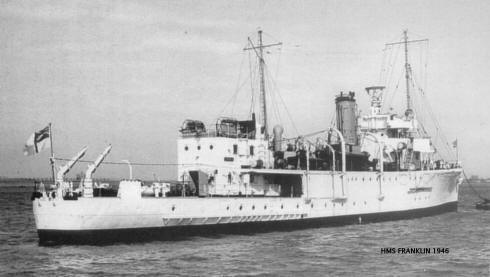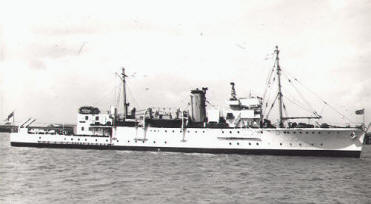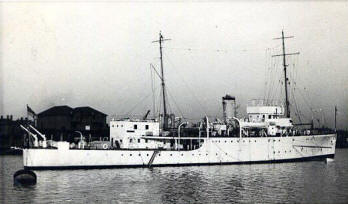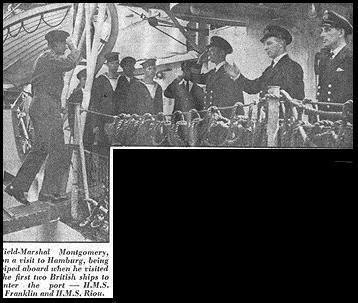











|
|

HMS
Franklin - Principal Surveys 1945
France, North Coast: Cherbourg; Le Havre; Dieppe.
Germany: Wreck clearance surveys of ports and approaches.
England, East Coast: Thames Estuary.
England South Coast: Portland Bay.
Commander: E I Irving
|


HMS Franklin
|
Date of Arrival |
Place |
Date of Departure |
Remarks |
|
20.2.45 |
Le Havre |
5.3.45 |
|
|
5.3.45 |
Cherbourg |
? |
|
|
10.3.45 |
Le Havre |
? |
|
|
? |
CTG 122.2 |
2.4.45 |
|
|
2.4.45 |
Sheerness |
? |
Undocking and completion
date for FRANKLIN is 24/4 |
|
11.5.45 |
Nore |
19.5.45 |
|
In
northern Europe FRANKLIN, still under Irving, carried out trials of
QM, later to be developed into the Decca Navigator system, in April
while waiting to enter German ports. She sailed from Sheerness for
Cuxhaven on 19 May, and carried out wreck clearance surveys there, and
at Hamburg, Heligoland, Kiel, Lubeck and Travemunde, as well as fixing
navigational buoys in the Baltic. She had two HDMLs (SMLs 3 and 4)
attached to her, with which she surveyed the Weser river from the sea
to the port of Bremen in August and September. Another SML, 5, made a
reconnaissance survey of the Rhine up to Cologne, while when the Weser
survey was completed SML 3 went to Denmark to assist the Danes in
opening up their ports.
Source: EXTRACTS from:
Charts and Surveys in Peace and War The History of the RN
Hydrographic Service 1919 1970 by Rear Admiral R O Morris CB
|
.Egg Irving in
FRANKLIN
had returned to the
Scheldt in the early months of 1945 to find a Decca chain erected with
stations in Belgium and Holland to provide navigation cover in the
estuary and river Scheldt as far as Antwerp, whence seaborne cargoes
were pouring into North West Europe. He began at once to test the
system with reference to the survey marks he had previously
established along the extensive dykes on either side of the river. On
V‑E Day Egg described his officers as 'well satisfied with the
equipment and pleased enough to celebrate the end of the War and the
success of Decca as a fixing aid.'
Source: Extract from No Day Too Long, G S Ritchie
|
The ship I was on was
independent command; we were very much on our own, which isn't very
nice at times, and we were off the coast of Germany: Heligoland by,
not far from Germany. And we picked up a radio message the war had
ended. So we immediately at top speed went right back to a place
called Terneuzen in Holland. I think that was possibly the most
startling and happy memory and that was followed too. Then very
shortly after that we'd to - within hours - we'd to leave Terneuzen
and go into the harbour in Germany. I forget, is it Cuxhaven or
Bremerhaven? I think it was Cuxhaven. And we went in in utter
darkness and then the next morning, when we out and looked around,
we were in the middle of this dockyard and every ship there, every
German ship there, was about ten times our size, so we thought,
'What are we doing here?' But obviously the war was ended.
About two or maybe three days after the war ended, there was the
official surrender of the German navy. Not the German nation, but
this was the German navy, because it was a naval base. And the ship
that I was on was quite a small one and we were there. By this time
there were sweepers with us, mine-sweepers and they were also very
small ships. But they were both types of ships where you didn't have
marching up and down. There was very little discipline, from that
point of view. And yet the crews from HMS Franklin, which I was on,
and the mine-sweepers actually represented the Royal Navy. So you
can imagine the situation of this great big square in Cuxhaven and
here was the 51st Highland Division with tanks there, sitting there
tanks, with machine guns trained on the poor prisoners-of-war,
Germans, and they were, I was sorry for them really. And they were
lined, called to attention while the representatives of the Royal
Navy marched in. And you could tell that the only ones who could
march were boys that had been in the Boys' Brigade because there had
been no time during the training to get ready these personnel for
the landings. There was no time to do the marching. You could tell
the boys who had been in the Boys' Brigade; it's the only ones that
kept in step.
Source: William Shand
http://www.ambaile.org.uk/en/item/item_audio.jsp?item_id=36351
|
|
21.5.45 |
Cuxhaven |
? |
|
|
? |
Keil |
14.6.45 |
|
|
? |
Hamburg |
7.7.45 |
|
|
4.7.45 |
Nore |
22.7.45 |
FRANKLIN taken in hand
10/7, completion 18/7 |
|
24.7.45 |
Wilhelmshaven |
? |
|
|
|
|
|
 |
|
? |
Hamburg |
8.9.45 |
FRANKLIN due Chatham 10/9
has sustained damage. Earliest date can be made available 20/9
From BNC in CG: As there
are no further requirements for FRANKLIN in my command consider it
preferable for her to proceed to UK rather than remain in Germany |
|
10.9.45 |
Sheerness |
22.10.45 |
11/9 FRANKLIN taken in
hand for docking, boiler cleaning and defects. Completion date
uncertain. |
|
23.10.45 |
Portland |
27.10.45 |
|
|
28.10.45 |
Cardiff |
? |
|
|
7.11.45 |
Loch Ryan |
? |
|
|
10.11.45 |
Portland |
? |
|
With the war in Europe ending in May 1945 and that in the Far East in
September the first call on the Hydrographic Service was to survey and
re‑chart the devastated ports of Europe, the Mediterranean and the Far
East, and to assist in clearing minefields and charting safe passages
through those which could not be cleared immediately.
FRANKLIN and Scott were quickly disarmed and
restored to full surveying status. A minor distinction which
identifies them post-war is that while
FRANKLIN's
mainmast was restored to its pre-war position for'ard of the
chartroom, Scott's was stepped on the chartroom roof.
Source: EXTRACTS from:
Charts and Surveys in Peace and War The History of the RN
Hydrographic Service 1919 1970 by Rear Admiral R O Morris CB
|
|

